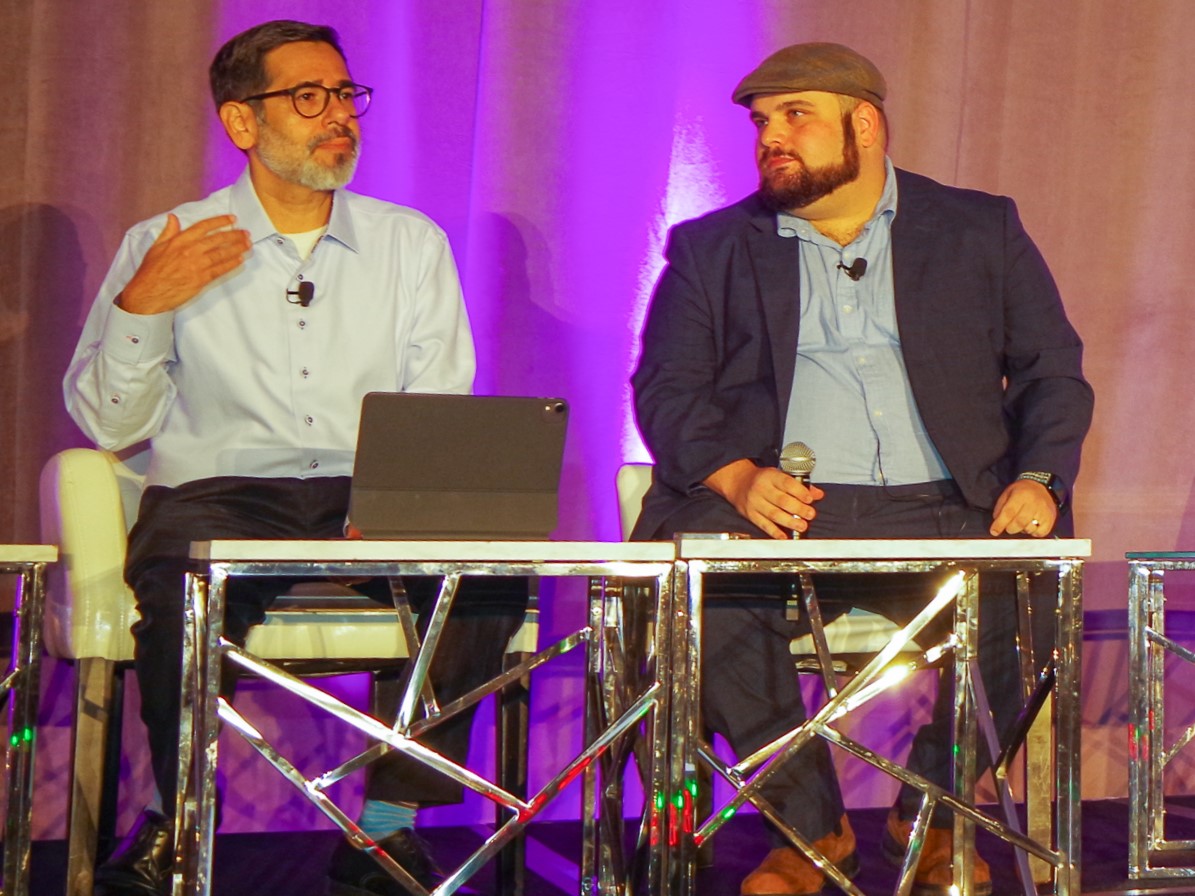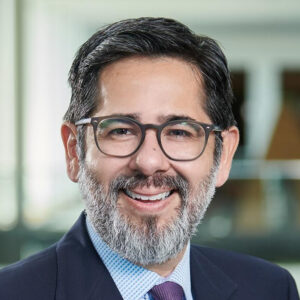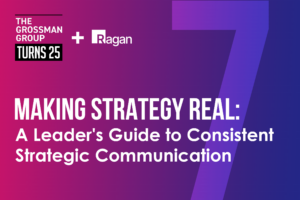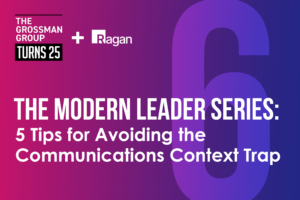General Mills CCO Jano Cabrera on adapting strategy to the business landscape
Cabrera shares lessons learned throughout his illustrious career in politics, brand and agency comms.

(L-R) Cabrera and Joffe onstage at Ragan and PR Daily's Social Media Conference, Sept. '22 (Photo by Stephen Mease)
The most effective communications leaders understand that there’s wisdom in working on both the agency and client side of the aisle —and that both have room for creativity when you consider the needs of the business first.
Jano Cabrera, CCO of General Mills, understands this better than most. Cabrera’s path to the C-seat was paved during an illustrious career that included serving as deputy press secretary for Vice President Al Gore and the national spokesman for the Democratic National Committee, serving as a chair and VP at Burson (then Burson-Marsteller), and becoming the SVP of corporate relations at McDonald’s.
Cabrera caught up with Ragan and shared his thoughts on embracing the global language of finance, the power of choosing what not to say, and the importance of adopting a ‘fewer, bigger, better’ approach to strategic communications campaigns. He’ll share more during our webcast with The Conference Board, “What Initiatives Are Communications & Marketing Taking for the Elections?” on June 25th.
This conversation has been edited for length and clarity.
Justin Joffe: When, in the first political communications chapter of your career, do you start to understand behavioral trends and marry them to communications styles? Was there a moment when that clicked for you?
Jano Cabrera: Yeah. I learned this lesson very early on. It’s carried through from political war rooms into corporate boardrooms. I was young when I was working on political campaigns and had a responsibility well beyond my years of being a spokesperson, first for people on the Hill and then later for the Vice President of the United States. It’s a big responsibility.
Now, when people hear that, they think that’s the guy or gal speaking on behalf of the person to a journalist. And that’s true, but that’s just part of the job — the door swings the other direction as well. I needed to be able to explain, ‘This is the interview you’re about to do. It’s with this person, and here’s what I think they’re going to ask.’ Early on, I focused way too much on the what — you know, ‘This is an interview about your recent announcement on livable communities.’
Very quickly, I learned I was doing a disservice to my principal. Most of the time, journalists come in with a question or two on a topic they’re likely going to write about, but they have so much more they want to write about. So the job is really to see what else they have written. What is your theory of the case? Less ‘what’ and more ‘why’.
Why do they want this time with the principal? Where are the dangers and pitfalls that they might have started by asking a question about x but because y just happened in the political environment? You now need to be ready to answer that question.
It’s shifting your mind from ‘Here are the basics’ to ‘Here’s the strategic landscape that we’re playing in’. That helped me immensely because it meant that every time I had a conversation with a principal early on in my career, I wasn’t focused on what we were doing but why we were doing it—the context, the strategic landscape in which we were doing it.
Once you reach this level in the C-suite, of course, it’s the same. What’s the landscape that the business finds itself in?
Omniscience requires some cross-functional visibility, though. We know that comms are dot connectors. We know that strategic comms incorporates every function and business unit in harmony. But the visibility doesn’t always happen.
JC: Yeah, I couldn’t agree more. I often say that we all speak multiple languages, even if you just think you just speak English. That might be the sole language you’re thinking of, sure, but you also speak the language of the zeitgeist. I can make the sound from “Law and Order” and you’re already hearing it in your head. I’m hearing it. There are these similarities that we share.
There’s another language that we should all speak, which is the language of finance. And the reality I’ve found over the course of my career is that communicators rarely speak the language of finance. If you say CAGR and get a blank look, that’s okay. Because most of the time they’re just getting stuff from IR or the finance team.
They’re getting curated language, learning these terms only when they are already a place in the narrative instead of shaping the narrative with their knowledge.
JC: That’s exactly right. And that means there’s a limit as to how strategic you can be. If you literally can’t speak the same language as the person you’re there to provide service to, if what they’re saying sounds like a foreign language to you, what possible service could you provide? There is a book that I recommend to everybody called “The 90-Minute MBA” and it’s going to give you the language of MBAs.
When you go into most C-suites, that’s the language they’re speaking. The GC is going to speak the language of law school and MBA. Even if they’re not MBAs, they will by osmosis learn that language. There is some overlap between the two. But communicators have to go out of their way.
It seems like business acumen isn’t just a bridge across functions, but also universal language when managing a global stakeholder set. When you’re managing multiple regions, is the language of finance a unifier?
JC: Absolutely. I would have a very different answer if we were talking about communications in the political space, because that’s a different language. But if you’re talking about communications in the corporate space, the language of business is business. And the business language is MBA language, MBA-ese, if you will. You don’t have to become entirely fluent, but you’ve got to get better than most communicators are when they start.
I’m intrigued to know how that followed you out of politics. You were the National Spokesman for the DNC, then the Communications Director. But then you move to the agency side as Burson Marsteller (now Burson) . What made you want to go to the agency side?
JC: Unfortunately, there is always the law of diminishing returns when it comes to doing something you genuinely love. And I love politics. But it ages you in dog years. You have to give more than 12-hour days practically 365 days a year. It’s exhausting, so I wanted a break.

Jano Cabera, CCO, General Mills
But I loved the skill set of communications. What’s similar? Corporate consulting. The gift that I took from one space to the other is that, most of the time when people think of a campaign discipline, they think, ‘I’m gonna say the same thing over and over again until not only is my audience sick of hearing it and I’m sick of saying it.’
Sure, that’s one aspect. The other aspect of campaign discipline is choosing what not to say. And being very focused really does require you to say, ‘Look, there’s so much I could touch on, but I’m going to I’m going to focus on these things because I just want to be known for them.’
Once I started consulting, one of the things that I would often find with clients is, ‘Here’s the problem that you hired us to solve, here’s a campaign here’s, how we’re going to do it.’ To the extent that it needed to evolve through conversation, it would. The client mindset is very important.
But sometimes our best counsel was, ‘That’s actually not a part of this.’ Like if you, Intel, want to be known as like American jobs manufacturer and get credit in DC for the billions of dollars that you pumped into the economy, I understand that you also want to talk about STEM—but that’s a separate campaign. Those two things might run in parallel, but don’t try to mix them because there are different messages.
Now that I’m client side, it’s even more important, because you have limited time, limited budget, limited time for your team, and executives. You have to pick and choose the fewer, bigger, better. That is the lesson—fewer, bigger, better matters.
When it comes to communications, pick your shots, fund them well, resource them as appropriate and put those chips on the table. If you try to water it all down and bet everywhere, the house is gonna win. Nothing’s gonna break through.
So you’re at Burson for over eight years, and then you go to McDonald’s as an SVP of Corporate Relations. It seems like you wanted to get back to the client side and get to focus on one thing.
JC: When I think of my career, I think of it in chapters. The first big chapter was politics and government. The second big chapter was me trying to figure out what do I want to do next and finding that I genuinely like corporate consulting.
And the third big chapter, which I’m in now, is the client side. I always felt that I was missing something because if I’m advising as I once did at Microsoft, Wells Fargo, Bank of America or whatever the client may be, there was a part of me that kept thinking ‘I actually don’t know what it’s like to be in your shoes.’ I’m giving you great counsel as I see it because there’s so much exposure from working at big agency. I see so many decks, I have so many conversations and horizontal thinking can help you.
Once I went client side, I got it. On the agency side, you’re always coming up with big ideas, you’re putting them forward and you’re frustrated. But if you really want to know what the client side is like, all you have to do is watch “Game of Thrones.” It is much more about the politics of whatever the culture is that you’re residing in. And to be clear, I’m not saying that every corporate culture is toxic.
But brand tribalism is a real thing.
JC: Absolutely. It’s understanding how you speak to the stakeholder. You might have an idea, but in order to advance anything you’ve got a win over everyone. I used to watch CCOs ask for a deck and be really passionate about an idea. And then it just went into the ether, just dissipated over time, and I was curious why couldn’t it come to be. Now that I’m on the client side, I understand—you might have a lot of passion for idea, but then you might have an agency develop a deck for you.
Sounds like there’s a player/coach piece to this too. I’ve always been surprised at how willing you are to roll up your sleeves and get involved in the process — frankly, that’s not something everyone in the C-suite makes the time to do. It sounds like this shift was similarly an extension of you wanting to do the work.
JC: 100%. I am now doubly happy. I genuinely enjoyed the agency side and I love that chapter of my career. But now I understand that world and I understand the corporate world. And I feel like it’s allowed me to unlock the power of both. I can turn to an agency partner and say, ‘This is the deck I need, this is what I want and internally, I’m now going to unlock all these doors to the best of my ability.’ So what I envision and work with an agency on I can actually make a reality.
I think everyone over the course of their career has worked with someone who has skipped a step. They somehow get to a position of power, but they don’t actually understand or appreciate how it all works. And that’s very painful.
My father was in the military, and I still remember him saying that if you think about a general, they can be lazy or hardworking. They can be smart or dumb. But the best general is the one who’s hardworking and smart. Now you might think that the worst one is lazy and dumb—but it’s actually someone who’s hard-working and dumb, because they’re causing a lot of chaos. They’re working hard, but not really connected or understanding the waters they’re in.
This column is about ‘seizing the C-seat’, so I’d be remiss to not ask what lesson resonates loudest since you became CCO at General Mills after your time at McDonald’s.
JC: There’s so much that communicators can imagine, because by nature, because we’re creative people by nature. The problem is that if you’re creative, if you can imagine something that is awesome and wonderful, you think it can provide value.
But if what you’re imagining is somehow divorced from the business, and you haven’t got that buy-in from the C-suite? You can come up with a campaign that wins a lion at Cannes and your business leaders would say they don’t care. Or even worse, ‘How much did you spend on that?’ Creativity can be in service of the business needs.
Justin Joffe and Jano Cabrera will continue the conversation during our webcast with The Conference Board, “What Initiatives Are Communications & Marketing Taking for the Elections?” on June 25th.







